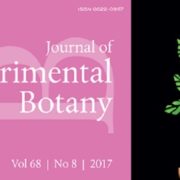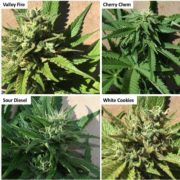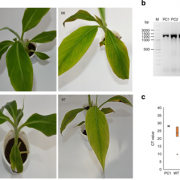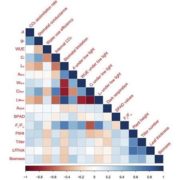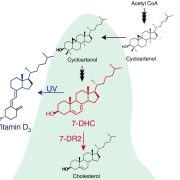Triacylglycerol remodeling to synthesize unusual fatty acids in plants
 Plant oils, composed of fatty acids, provide humans and animals with food, essential nutrients, chemicals, and biofuels. Plants accumulate over 450 “unusual” fatty acids, which could hold significant value if they achieve optimal production. Hydroxylated fatty acids (HFA) are unusual fatty acids that have applications in industrial production of paints, polymers, and cosmetics. Attempts to engineer crops with HFA have resulted in low HFA levels and decreased seed oil phenotypes due to bottlenecks in overlapping pathways of oil and membrane lipid synthesis, where HFA is incompatible. Parchuri et al. discovered a new mechanism in the brassica Physaria fendleri that naturally overcomes these bottlenecks via remodeling of the initially synthesized triacylglycerol (TAG) with HFA. The TAG remodeling mechanism involves the concerted action of typical fatty acid-specific lipase and HFA-specific acyltransferase enzymes. The authors further engineered this mechanism in Arabidopsis, employing it as a genetic engineering tool to enhance HFA levels in seed oil. In the future, TAG remodeling can be induced in other crops for the production of nutritionally and industrially valuable fatty acids in seed oil. (Summary by Maneesh Lingwan @LingwanManeesh) Nature Comms. 10.1038/s41467-024-47995-x
Plant oils, composed of fatty acids, provide humans and animals with food, essential nutrients, chemicals, and biofuels. Plants accumulate over 450 “unusual” fatty acids, which could hold significant value if they achieve optimal production. Hydroxylated fatty acids (HFA) are unusual fatty acids that have applications in industrial production of paints, polymers, and cosmetics. Attempts to engineer crops with HFA have resulted in low HFA levels and decreased seed oil phenotypes due to bottlenecks in overlapping pathways of oil and membrane lipid synthesis, where HFA is incompatible. Parchuri et al. discovered a new mechanism in the brassica Physaria fendleri that naturally overcomes these bottlenecks via remodeling of the initially synthesized triacylglycerol (TAG) with HFA. The TAG remodeling mechanism involves the concerted action of typical fatty acid-specific lipase and HFA-specific acyltransferase enzymes. The authors further engineered this mechanism in Arabidopsis, employing it as a genetic engineering tool to enhance HFA levels in seed oil. In the future, TAG remodeling can be induced in other crops for the production of nutritionally and industrially valuable fatty acids in seed oil. (Summary by Maneesh Lingwan @LingwanManeesh) Nature Comms. 10.1038/s41467-024-47995-x


